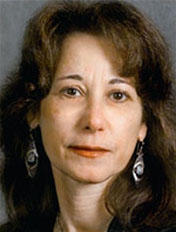Professor Judith Campisi
Judith Campisi, Ph.D. is Professor, Buck Institute for Research on Aging and Senior Scientist, Lawrence Berkeley National Laboratory.
Judy has received international recognition for her contributions to understanding why age is the largest single risk factor for developing a panoply of diseases, ranging from neurodegeneration to cancer. Her highly acclaimed research integrates the genetic, environmental, and evolutionary forces that result in aging and age-related diseases, and identifies pathways that can be modified to mitigate basic aging processes.
Judy also makes significant contributions to understanding why aging is the largest single risk factor for developing cancer. She is widely recognized for her work on senescent cells — older cells that have stopped dividing — and their influence on aging and cancer. Senescence occurs when cells experience certain types of stress, especially stress that can damage the genome. The senescence response helps prevent cancer by blocking damaged cells from multiplying. But there is a trade off — the lingering senescent cells may also cause harm to the body. The Campisi lab found evidence that senescent cells can disrupt normal tissue functions and, ironically, drive the progression of cancer over time. Senescent cells also promote inflammation, which is a common feature of all major age-related diseases.
She is collaborating with many other research groups at the Buck Institute to examine other suspected influences of senescent cells on other diseases of aging. Her research is shedding light on anti-cancer genes, DNA repair mechanisms that promote longevity, molecular pathways that protect cells against stress, and stem cells and their role in aging and age-related disease.
Judy earned her Ph.D. in Biochemistry from the State University New York at Stony Brook and completed postdoctoral training at the Harvard Medical School. As an assistant professor at the Boston University Medical School, she became interested in the control of cellular senescence and its role in tumor suppression and aging. She joined the Lawrence Berkeley National Laboratory as a Senior Scientist in 1991. She established a second laboratory at the Buck Institute in 2002. At both institutions, she established a broad program to understand various aspects of aging, with an emphasis on the interface between cancer and aging.
Her papers include: Cellular senescence: when bad things happen to good cells, Senescent fibroblasts promote epithelial cell growth and tumorigenesis: A link between cancer and aging, Oxygen sensitivity severely limits the replicative lifespan of murine fibroblasts, Cellular senescence as a tumor-suppressor mechanism, Reversal of human cellular senescence: roles of the p53 and p16 pathways, and Repression of c-fos Transcription and an Altered Genetic Program in Senescent Human Fibroblasts.
The Campisi laboratory has made several pioneering discoveries in these areas, and her research continues to challenge and alter existing paradigms. In recognition of the quality of her research and leadership in the field, she has received numerous awards, including two MERIT awards from the US National Institute on Aging, and awards from the AlliedSignal Corporation, Gerontological Society of America, American Federation for Aging Research, and, most recently, the Longevity prize from the IPSEN Foundation. She currently serves on numerous national and international editorial and advisory boards including as co-Editor-in-Chief of Aging.
Watch Judith Campisi: The Double-Edged Sword of Cellular Senescence, Interview with Judith Campisi, Ph.D., Futures in Biotech 74: Cancer and Aging: Rival Demons with Dr. Judith Campisi, and The Flourishing Affliction of Old Age. Read 15th Longevity Prize of La Fondation Ipsen: Professor Judith Campisi is Awarded in Recognition of the Outstanding Work She Has Been Carrying in the Domain of Longevity, Senescence and Cancer.
